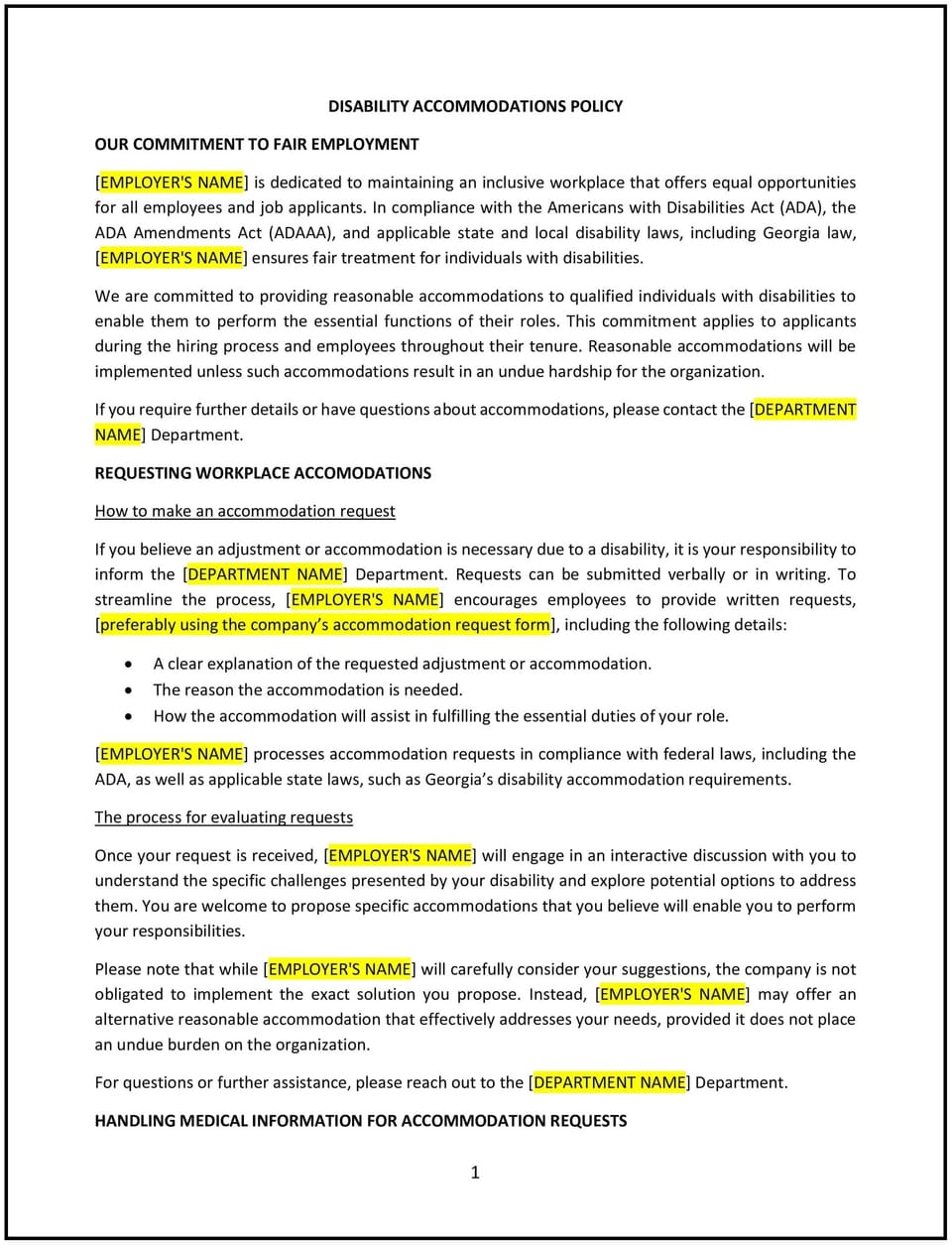Disability accommodations policy (Georgia): Free template

Disability accommodations policy (Georgia)
This disability accommodations policy is designed to help Georgia businesses create an inclusive work environment by providing reasonable accommodations for employees and applicants with disabilities. The policy outlines the process for requesting accommodations, assessing needs, and ensuring accessibility in the workplace.
By implementing this policy, businesses can promote equity, enhance productivity, and demonstrate a commitment to supporting diverse talent.
How to use this disability accommodations policy (Georgia)
- Define reasonable accommodations: Specify the types of adjustments that may be provided, such as modified work schedules, assistive devices, or accessible workspaces.
- Establish a request process: Outline the steps employees or applicants should follow to request accommodations, including submitting requests in writing and providing relevant documentation.
- Designate a point of contact: Identify a specific person or department responsible for handling accommodation requests and ensuring timely responses.
- Assess requests individually: Evaluate each request based on the individual’s needs and the business’s ability to provide the accommodation without undue hardship.
- Maintain confidentiality: Ensure that all information related to accommodation requests is handled confidentially and shared only with those directly involved in the process.
- Provide training: Offer training for managers and employees on disability awareness, the accommodation process, and fostering an inclusive workplace.
- Monitor accommodations: Regularly review the effectiveness of accommodations and make adjustments as needed to meet the employee’s requirements.
- Review and update regularly: Periodically review the policy to reflect changes in Georgia laws, workplace needs, and accessibility standards.
Benefits of using this disability accommodations policy (Georgia)
Implementing this policy provides several advantages for Georgia businesses:
- Promotes inclusivity: Accommodations help create an environment where employees with disabilities can thrive and contribute fully.
- Enhances employee engagement: Supporting individual needs fosters loyalty, morale, and overall job satisfaction.
- Reduces barriers: Addressing accessibility issues helps employees and applicants perform their roles effectively and confidently.
- Strengthens reputation: Demonstrating a commitment to diversity and inclusion enhances the business’s reputation among employees, clients, and the community.
- Reflects Georgia-specific considerations: Tailoring the policy to local regulations and workforce expectations ensures relevance and effectiveness.
Tips for using this disability accommodations policy (Georgia)
- Communicate openly: Ensure all employees understand their right to request accommodations and how to do so.
- Be proactive: Regularly assess workplace accessibility to identify and address potential barriers before they become issues.
- Support managers: Train managers on how to respond to accommodation requests and support employees with disabilities effectively.
- Encourage feedback: Create opportunities for employees to provide input on the effectiveness of accommodations and suggest improvements.
- Track outcomes: Monitor accommodation requests and their resolutions to ensure the process is working effectively and fairly.
Q: What are reasonable accommodations under this policy?
A: Reasonable accommodations include adjustments or modifications that enable employees or applicants with disabilities to perform essential job functions. Examples include flexible schedules, assistive technology, and ergonomic workstations.
Q: How can employees request accommodations?
A: Employees should submit a written request to the designated point of contact, outlining their needs and, if applicable, providing supporting documentation.
Q: Who evaluates accommodation requests?
A: A designated individual or team, such as HR, is responsible for reviewing requests and working with the employee to determine appropriate accommodations.
Q: How is confidentiality maintained?
A: Information related to accommodation requests is kept confidential and shared only with those directly involved in the process.
Q: Can businesses deny an accommodation request?
A: Businesses may deny requests if providing the accommodation would cause undue hardship. However, they should work with the employee to explore alternative solutions.
Q: How often should accommodations be reviewed?
A: Accommodations should be reviewed periodically to ensure they remain effective and aligned with the employee’s needs.
Q: How often should this policy be updated?
A: The policy should be reviewed annually or whenever there are changes in Georgia laws or accessibility standards that affect workplace accommodations.
This article contains general legal information and does not contain legal advice. Cobrief is not a law firm or a substitute for an attorney or law firm. The law is complex and changes often. For legal advice, please ask a lawyer.


